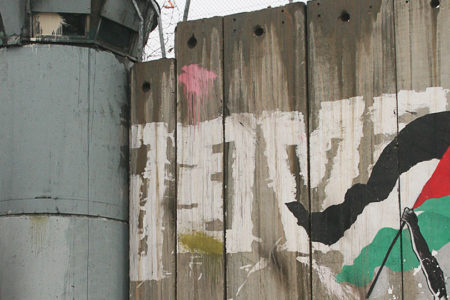A Wow Moment
The beat goes on as the Arabs pick up where the Ammonites left off.
Have you ever read a Scripture verse you had read many times before, but suddenly it seemed brand new to you? I have. I call it a Wow! moment.
My most recent Wow! moment came after reading Judges 11: “And the king of the people of Ammon answered the messengers of Jephthah, ‘Because Israel took away my land when they came up out of Egypt, from the Arnon as far as the Jabbok, and to the Jordan. Now therefore, restore those lands peaceably’” (v. 13).
More than 3,000 years ago, the king of Ammon accused Israel of taking “his” land, and he wanted it back—or else. Wow! Israel was accused of stealing land and told to give it back. That scenario reverberates almost daily. At its core lies bad history because it wasn’t true then, and it isn’t true today.
The Ammonites attacked Israel (v. 5). Jephthah, Israel’s judge/leader, tried diplomacy first to keep the peace. He sent messengers to their king, asking him why he wanted to fight (v. 12). That’s when the king accused Israel of stealing land (v. 13).
Jephthah addressed the king’s false narrative by sending messengers to give the king the truth about Israel’s existence in the land. When the Israelites had left Egypt, they had asked permission to pass through other kingdoms. The land in question was territory Israel had won in a battle 300 years earlier, when attacked by the Amorites, not the Ammonites (v. 26).
Jephthah told the king the real story: “Israel did not take away the land of Moab, nor the land of the people of Ammon” (v. 15). However, neither Jephthah’s diplomacy nor his facts prevailed. Israel was forced to defend itself. In this case, “the Spirit of the Lord came upon Jephthah,” and Israel was victorious (v. 29).
Watershed Events
This year marks the anniversary of several events in Israel’s history that correct the more modern narrative that Israel is a land-grabber and demonstrate Israel’s respect for international law, diplomacy, and proper use of defense.
First Zionist Congress. It is the 120th anniversary of the First Zionist Congress that met in Basel, Switzerland. At that time Theodor Herzl wrote in his diary, “At Basel, I founded the Jewish State. If I said this out loud today, I would be answered by universal laughter. Perhaps in five years, certainly in 50, everyone will know it.” The meeting motivated Jewish people around the world to raise money to pay the exorbitant prices absentee landowners were demanding for territory in the Holy Land, which at that point was part of the Ottoman Empire. The effort facilitated the first Aliyah (return to Israel).
Balfour Declaration. It is the 100th anniversary of the Balfour Declaration, which declared the British government’s favorable disposition toward “the establishment in Palestine of a national home for the Jewish people.” It promised Britain’s “best endeavors to facilitate the achievement of this object, it being clearly understood that nothing shall be done which may prejudice the civil and religious rights of existing non-Jewish communities in Palestine or the rights and political status enjoyed by Jews in any other country.” The emphasis on following international law was a primary consideration in establishing Israel as a state.
United Nations Resolution 181. Seventy years ago, on November 29, 1947, the UN partitioned Palestine into a Jewish state and an Arab state. Israel accepted the plan; the Arabs rejected it and attacked Israel instead. The plan has formed the basis for a two-state solution to the Arab-Israeli conflict and for the 1993 Oslo accords.
Khartoum Resolution. Fifty years ago, several months after the Six-Day War in which Israel soundly defeated its enemies, Israel offered to discuss peace. However, the 1967 Arab League summit met in Khartoum, Sudan, presented a seven-point resolution, and issued its three famous “Nos.” Item 3 states, “The Arab Heads of State have agreed to unite their political efforts at the international and diplomatic level to eliminate the effects of the aggression and to ensure the withdrawal of the aggressive Israeli forces from the Arab lands which have been occupied since the aggression of June 5. This will be done within the framework of the main principles by which the Arab States abide, namely, no peace with Israel, no recognition of Israel, no negotiations with it, and insistence on the rights of the Palestinian people in their own country” (emphasis added).1
Israel’s enemies act like the king of Ammon, claiming Israel has stolen land.
The Narrative Continues
In December 2016, Newsweek magazine ran an article by Diana Buttu, “Why the World Must Act to Stop Israel’s Insatiable Appetite for Palestinian Land.” Buttu wrote, “And yet, while recognizing that Israel’s desire for Greater Israel has only served to oppress Palestinians, the U.S. administration continues to cling to the same, tired formula—that of bilateral talks—instead of pressing Israel to stop its land theft.”2
ISRAEL ON HIGH ALERT
Read more about the enemies that threaten the Jewish state in Israel on High Alert by Ron Rhodes.
In May, The Economist, a respected, 173-year-old London periodical, ran a special report on Israel for the 50th anniversary of the Six-Day War. The cover pictured a Star of David with a Palestinian flag-covered lock clamped onto the star. Inside the star were the words Why Israel needs a Palestinian state. The special report began with the headline, “Six days of war, 50 years of occupation.” The implication perpetuates the Arab narrative that Israel steals land.
Telling the true story was radio host Larry Elder, who wrote some years ago “The Truth About Israel’s ‘Stolen’ Land” in wnd.com. He supplied an accurate history of the situation and concluded,
The word “Palestinian,” as employed today, is a relatively recent term. Until the end of the British mandate over Palestine, in 1948, all inhabitants of the area west of the Jordan River were known as “Palestinians.” A Jewish person living in what is now Israel was a “Palestinian Jew.” An Arab living in the area was a “Palestinian Arab.” Likewise, a Christian was known as a “Palestinian Christian.” Israel won more land after a series of wars, land since returned or offered for return in exchange for peace. The Jews “stole” nothing.3
As a judge of Israel, Jephthah was forced to fight against the Ammonites because they got history wrong. Today Israel is forced to defend itself against its legion of enemies who purposely make history wrong.
Sadly, history repeats itself. Would to God that people accusing Israel of land grabbing have their own Wow! moment.
Endnotes
- “The Israeli-Palestinian Conflict: Arab League Summit—Khartoum 1967—English text,” ecf.org.il <goo.gl/YQ9Uj4>.
- Diana Buttu, “Why the World Must Act to Stop Israel’s ‘Insatiable Appetite’ for Palestinian Land,” Newsweek.com, December 30, 2016 <goo.gl/bkz3zT>.
- Larry Elder, “The Truth About Israel’s ‘Stolen’ Land,” wnd.com, January 8, 2009 <goo.gl/UBroNS>.








